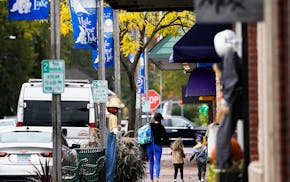Several hundred people — parents, pastors and business leaders among them — gathered Saturday in north Minneapolis for the second day of a "peace conference" focused on the enduring problem of young people shooting one another on city streets.
The speakers, including legendary singer Stevie Wonder and civil rights leader Benjamin Chavis, decried the number of young people being cut down by bullets in their own neighborhoods. Part of the solution, they said, is to offer young people caught up in poverty and dysfunction an alternative to street warfare, which has intensified in Minneapolis in recent weeks.
Wonder said that some of the violence has its roots in historical trauma. "You cannot say 'black lives matter,' and then kill yourselves," he said, closing the event by performing renditions of his hits, "Love's in Need of Love Today" and "Higher Ground."
"The first thing you must do is stop believing the fallacy of you not being important," he said. "Because it is completely unacceptable for one to hate themselves so much that anyone that looks like you, you want to kill."
The conference was organized by the Rev. Jerry McAfee, pastor at New Salem Missionary Baptist Church, where the gathering was held, and by Sharif Willis, a leader of the Vice Lords, a Chicago-based gang that Willis prefers to describe as a subcultural organization whose leaders now reject violence.
The event took on new urgency with the fatal shooting of a man early Saturday near Webber Park, less than 2 miles from the church. The homicide was the city's 15th of the year and the sixth slaying in two weeks.
Willis, who was released from prison earlier this year after serving a 25-year term for drug possession and weapons-related crimes, wants to put some young adults on Minneapolis streets to function as peacemakers.
In the early 1990s, Willis was a leader of United for Peace, an organization in Minneapolis that tried to dissuade gang members from shooting one another. It fell apart after Minneapolis police officer Jerry Haaf was shot and killed in 1992 at a pizza restaurant on E. Lake Street. Four people connected to gangs were convicted in that case.
Underlying causes
McAfee called on residents to address the underlying social conditions that account for crime. "You cannot talk about dealing with violence if you're not willing to talk about poverty," he said. More jobs and educational opportunities are needed, he said.
Several speakers lamented the collective apathy toward the killings of young black men, often at the hands of other blacks, while Chavis argued that any solution for the violence gripping parts of the city starts at home.
He said that parents should become re-engaged in their children's lives, instilling sound values and a sense of self-worth.
"Injustice is nothing new to us; pain is nothing new to us; disappointment is nothing new to us," Chavis said. "We're not struggling to struggle, we're struggling to win. Minneapolis needs to stand up, but the rest of black America needs to step up with them, just like they stood up for Ferguson," referring to protests in Missouri.
Resident Jeannette Sledge described being struck by a stray bullet as she drove through north Minneapolis.
"Raise your children in church," she said, "so they can understand the concept of right and wrong."
randy.furst@startribune.com • 612-673-4224 libor.jany@startribune.com • 612-673-4064

Shop the curbs for free on 'Trash to Treasure Day' in White Bear Lake

Longtime Uptown boutique closing in May

Meet the Athena Award winners: 103 female athletes honored by their schools

Lacrosse lists: 21 top players and the school that's No. 1 for boys and girls
